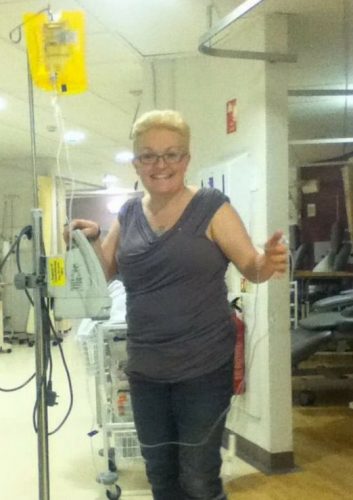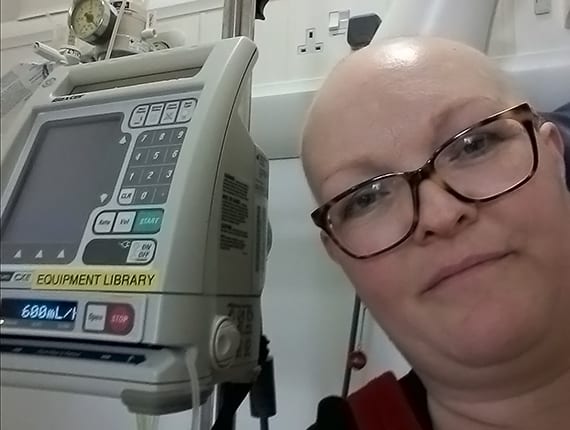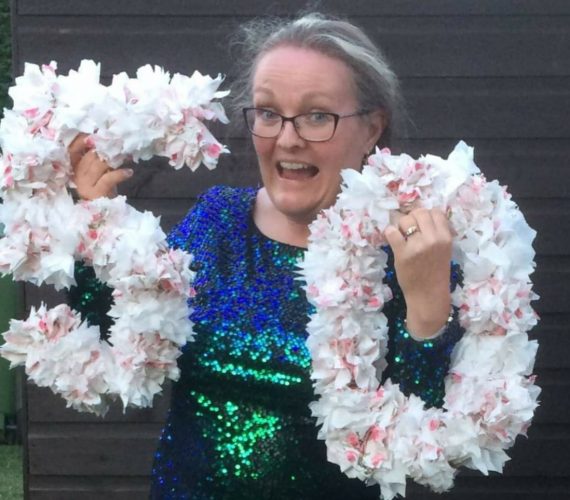Jo’s ovarian cancer story
A while ago, we were contacted by a woman thanking us for the Mooncup®️ “saving her sister Jo’s life” by helping with early detection of her ovarian cancer. Here’s Jo’s inspiring story, which she hopes will empower others with the knowledge to recognise the early signs of ovarian cancer, and to spread the word.
Hi. My name is Jo. I want to tell you a bit of my story and raise awareness of ovarian cancer and its symptoms. My story isn’t typical. My symptoms weren’t typical. However, I’ve met many beautiful women on my journey who have shared their stories with me. These women are strong and courageous and I write for them, whether they are still with us or not. Ovarian Cancer can be difficult to diagnose, but every woman I speak to agrees that the earlier the diagnosis the better, that we need to spread the word and get women, young and old, looking out for each other and each other’s health.
Keep reading… don’t be scared, don’t be afraid, don’t avoid the issue. The word cancer is hideous and makes us want to change the subject, to run in the other direction. I know. What I now understand though is that ‘knowledge is power’ and I’d like to help you to increase your knowledge. I hope that you will never have to use this knowledge, but keep your eyes and ears open for your family and friends.
The second thing I’d say is: ‘learn to love yourself – you spend more time with yourself than anyone else, and whether you know it or not, you are precious, so please treasure your life and know your body’. This is a reminder to know what is normal for you and your body and to raise the alert when things change. However old you are, if things start to change and cause you concern it’s always worth getting checked out. Don’t self-diagnose because you’re too busy to get to the doctors. Remember, you are precious.
What are the symptoms of ovarian cancer?
I’m going to share a list of symptoms that, with the help of those strong and courageous women that I mentioned earlier, I’ve come up with. The symptoms can be a bit vague – they point to other conditions first. It is known as a ‘Silent Killer’ but please don’t let it be silent anymore. In fact, it isn’t usually silent but it can whisper, and we live busy, loud lives and just don’t hear it. Our bodies are busy and complicated, and ovarian cancer is a liar and masquerades as other diseases. We need to be ready to hear that whisper if it’s there, and to recognise its lies, because unsuspecting women are being diagnosed very late. Let’s change that and give women a chance to get their lives back.
These things generally don’t show as symptoms on their own.
They should only cause concern if they persist, if they are new and if they are frequent.
For more information you could check out one of the websites listed at the foot of this post.
So, the more common symptoms of ovarian cancer to look out for are:
- A tummy that is constantly bloated
- Feeling full quickly when you are eating and struggling to eat
- Needing to wee more frequently
- Tummy pain or discomfort
Less common symptoms of ovarian cancer can be:
- Nausea and vomiting
- Loss of appetite
- Pain – groin pain, pelvic pain, back pain, shoulder and shoulder blade pain
- Heartburn, acid reflux and IBS type symptoms (that don’t go away)
- A change in bowel habits possibly with bowel cramps
- Unexplained breathlessness
- A new cough that doesn’t go away
- Bleeding or pain during and after sex
- Sciatica and or pain in your legs
These symptoms can always be explained away as other conditions, but if you don’t respond well to treatment, or you’re not getting anywhere with diagnosis, it is worth sharing your concerns about ovarian cancer with your doctor and asking if it can please be ruled out. Ask for a CA 125 blood test. If this comes back positive, it doesn’t mean that you have cancer, but it will give the doctor a reason to refer you for more investigation. Again, for more information please see one of the websites listed at the foot of this post.
My personal journey with ovarian cancer
So, how did I get my diagnosis? There were lots of little things that helped to push me in the right direction but I can take no credit for any of it. That’s probably why I’m so grateful to still be here.

I was a busy, 44-year-old, working Mum of two high-school age daughters. A difficult situation had occurred between a colleague and myself one morning at work and once on my own in the staff room I started to cry… and I couldn’t stop. I was on the verge of a panic attack and wasn’t quite sure how to compose myself to carry on with my day. I felt shaky, hormonal, all ‘out of sorts’ and the last thing I really needed, as I worked at a large high school, was to spend the next six hours in the company of difficult teenagers. When my colleague returned and realised that I had reacted so badly to the situation, she told me to go home and see if I could see a doctor. She was worried about me and felt that I may need some help.
I phoned the doctor immediately as I was now going home to rest and I didn’t know when I would make an appointment otherwise. There happened to be an appointment available that morning, and I went straight to the surgery, not quite sure what to say when I got there. The doctor didn’t offer much help but didn’t seem too concerned about me. So while I was there I mentioned that I was having problems with heavy periods as I thought I’d make the most of the appointment. I’m sure I’d mentioned period problems before, but it had never seemed very serious and I think I believed I was making a fuss about nothing. My periods had been odd my whole life, so nothing had immediately made me think that there was anything wrong. The doctor told me to go to my local Family Planning Clinic to get a coil fitted, as he felt this would help to make my periods more manageable. Finally, someone was listening to me and wanted to help. Good. I might no longer have to worry now about making a mess, or periods that lasted days and days.
Now, all this talk of periods, makes me think that I should mention my Mooncup. They contacted me because my sister wrote to them and thanked them for helping to save my life.
I decided to start using my Mooncup and got a bit of a shock.
I didn’t originally own a Mooncup but my sister recommended it to me. When it arrived, I noticed in the instructions that they talked about how much a woman should bleed during her period. It’s not something that I had ever discussed with any of my friends. I didn’t know what ‘normal’ was. I was never ashamed of my period, but it’s not an easy one to compare with your friends. Every time I started thinking that my experience wasn’t normal, I just told myself that I was being a drama queen and to get a grip, worse things happen. So, I decided to start using my Mooncup and got a bit of a shock. I was constantly emptying it. It was filling rapidly, and it got to the point where I still had to wear sanitary pad so that I didn’t leak. I was bleeding the same amount in one morning that other women bleed in the whole of their period. I had never been armed with information like this before. This information helped me later in the story when I came to see a gynae consultant.
I toddled off to the Family Planning Clinic, one evening just before Christmas. When I finally saw the doctor she told me that she couldn’t just fit a coil as she didn’t know what the reason was for my heavy bleeding and she referred me back to the GP. I felt really frustrated but trusted that she knew best. I later wrote to this doctor and thanked her for doing her job properly. With a coil fitted, things may have taken a very different path…
A GP from the surgery phoned me and I was referred to the Women’s clinic at Wythenshawe hospital. I attended my first consultation that February, where I explained that sometimes I felt overwhelmed by my hormones and that I was sure that my bleeding during a period was far too heavy. I even told him about my experience with my Mooncup and that this had convinced me that there could be a problem. He asked me about pain. I had been used to pain. I had had very painful periods all through my teens and twenties. Having had children, the pain had really reduced, and I was able to tell him that these days I would have a bit of discomfort, but nothing to worry about. I told him that during my period, if I needed to ‘do a poo’ that sometimes I would poo out blood and that I could have excruciating pain in the tummy following pooing, but this would ease after a few minutes and then I would just get on with my life again.
After a couple of different ultrasound scans and other examinations over the next few months, it was discovered that I had a cyst on my right ovary that was growing. I was then booked in for an investigative laparoscopy under general anaesthetic. My initial appointment with the GP was the previous November so it had taken eight months for me to get to this point. July 4th 2013 was the day in question. I gave the surgeon permission to remove my ovary and the cyst during the procedure if he felt it necessary. So, a ten-minute investigative procedure, under anaesthetic, became a slightly more major op. I’d never been to hospital before other than to give birth and had never had a general anaesthetic. I was just very glad that someone was taking me seriously, although I didn’t like the idea of surgery – even a little one.
The next morning, still groggy from the anaesthetic, I woke to be greeted by my surgeon doing his ward round. Smiling, he sat down on the side of my bed and asked if I wanted to see the photos of what he had found. Yes, you heard me correctly. It took a minute for me to register what he was saying. I was squeamish, but also curious, so agreed, and was shown the weirdest ‘holiday snaps’ I’ve even seen – while he pointed out what bits of my insides I was looking at. He then asked me why I had not mentioned being in any pain to him. I didn’t really understand but explained that I hadn’t really been in any pain, I had just bled a lot. He then continued to tell me that I had what they thought was a really aggressive form of endometriosis, which was what was causing my heavy bleeding, and that my insides were bound together with scar tissue. He had removed as much of the tissue as he could, along with my right ovary and the large ovarian cyst. All I had to do now was go home, get my hubby to look after me, take a couple of weeks off work, and come back in six weeks for an aftercare check-up.
Well, we finally had found out what my problem was, and it looked like we had a good result.
One afternoon, ten days later, I answered my phone to a number I didn’t recognise. It was my surgeon’s secretary who was quite flustered and wanted to know if I could get to the hospital to see my surgeon that afternoon.
I went in to see my surgeon with my husband, and wasn’t worried, until it dawned on me that he had wanted to see me himself because he had bad news. He drew me a diagram of the cyst that he had found and was explaining something to me – I was trying to stay focused, but instead panic set in, and before I knew it, the room was spinning. Had my surgeon just told me that he had found ovarian cancer inside the cyst?
My surgeon just told me he found ovarian cancer inside the cyst
That was when I got on the roller coaster. A roller coaster that involved being referred to the Christie hospital for 18 weeks of chemotherapy, being booked in for a full hysterectomy just two weeks away (on my 45th birthday), having to decide what to tell my daughters, my colleagues, my parents, my sister. This roller coaster didn’t stop, didn’t slow down, didn’t give you breathing space to take in what you were trying to comprehend. You just moved along with it, being taken along on the ride. I soon learnt what a CT scan was. I went for a check up after my hysterectomy, this time with a different surgeon. I was now being told that the story was changing and that they had found more cancer. This time in the endometriosis that had been removed during my hysterectomy. I was grateful that these things had been found. If I’d not bothered asking about my periods, how long would it have taken for the cancer to be found? Months? Years?

I was booked in for chemotherapy that September and finally, in January 2014, I finished 18 weeks of treatment and waited for my hair, my eyebrows, my eyelashes – in fact, every hair on my body, to grow back.
That Easter I started attending Pilates classes to help my joints that were suffering after chemo, and to improve my fitness. I was walking a lot and eating healthily, ready to return to work that May. The future looked bright. 2014 was a good year. We celebrated my health with a holiday to America. I returned to a new job at work that September and all went well.
I’d had a routine check up at the Christie the previous December, but as far as I was concerned, all had gone well. I was shocked to receive a letter that January asking me to return to the hospital for another blood test and the results needed double checking. It appeared that I had had an abnormal CA125 test.
The next test also gave an abnormal reading and by the April I was being booked in for a further CT scan and investigative surgery. Things weren’t looking good. 2015 wasn’t turning out quite how I’d have liked. My surgeon prepared me for the worst, but the surgery didn’t quite turn out as planned. He couldn’t find the tumours. Yes, that’s right, he opened me up and then couldn’t find the tumours that he’d seen on the CT scan.
I spent another few weeks recuperating from this surgery. I was slightly baffled and as soon as was possible I requested another CA125 as I wanted to know whether the numbers were still rising – and when I finally got a test and received the results, there definitely were tumours, they just didn’t know where they were.
A meeting was held at the Christie. Groups of medical staff discussed different cases and a bowel surgeon who had heard about my case asked if he could look at the scan. He was convinced that I now had bowel cancer. However, only pathology tests done once the cancer was removed would confirm what was going on.
I have a big yet beautiful scar. And I love that surgeon. He saved my life. And it was ovarian cancer. I’ve just celebrated being cancer free for 5 years.
He booked me in for surgery at The Christie on 10th September 2015. It was a big operation. I have a big yet beautiful scar. And I love that surgeon. He saved my life. And it was ovarian cancer. I’ve just celebrated being cancer free for 5 years. I have had the privilege of seeing my daughters leave school and go on to further education. I partied like never before on my 50th birthday, delighted to see my 50s.

During my ‘little adventure’, I met many women who had been diagnosed too late. Mostly their symptoms had pointed to other issues that never got resolved. By the time the true nature of their disease was recognised, it was far too late for treatment to be overly effective. I feel like such a party pooper to have to tell this side of the story, but for these women, who I know would love to still have a voice and who would love the opportunity to tell their stories to save future lives, I am speaking out. Know your body. Listen to what it is saying. Seek medical help early. Ask for ovarian cancer to be ruled out if you have symptoms. Look out for the women in your life. Be brave.
I don’t want to take life for granted again.
None of us should take life for granted. Cancer isn’t a great subject. But cancer is a subject that I can talk about, from first-hand experience. Cancer needs putting in its place.
Jo, September 2020.
For more information, please visit:
www.nhs.uk, www.targetovariancancer.org.uk, www.ovarian.org.uk, www.ovacome.org.uk, www.cancerresearchuk.org.
Find out more about the Mooncup® and get yours here.
Read more on the Mooncup blog:
What are the five gynaecological cancers and their symptoms?
How to keep your vagina and vulva happy & healthy
How to reduce period pain and cramps
What are fibroids? Causes, signs & treatment





